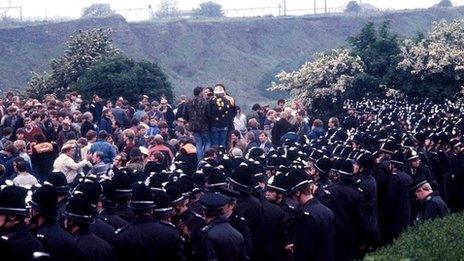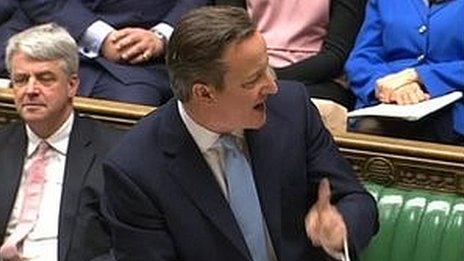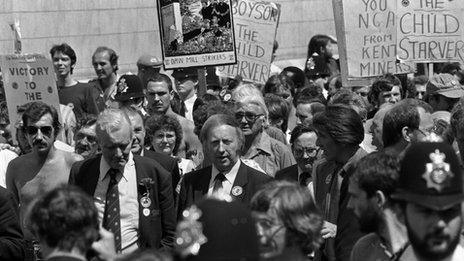Cameron rejects Labour call for miners' strike apology
- Published

Orgreave saw some of the most violent scenes of the dispute
David Cameron has rejected Labour calls for an apology for government actions during the 1984-5 miners' strike.
Labour claims recently released cabinet papers prove the Thatcher government had a secret plan to close 75 pits.
The party - which has launched a "justice for the coalfields" campaign - also says police came under political pressure to crack down on pickets.
But the PM said Arthur Scargill should apologise for the "appalling" way he led the miners' union.
His comments followed a question in the Commons from Labour MP Lisa Nandy, who said the miners and their families deserved an apology.
'Proper investigation'
The Wigan MP said: "This month's Cabinet papers reveal that the Thatcher government sought to escalate the miners' strike, close pits and undermine solidarity.
"The scars of that dispute run deep in communities like Wigan. Some families have never recovered and others have died waiting for justice. Thirty years on, they deserve the truth and they deserve an apology. Why are they still waiting?"
Labour is calling on the government to set out all details of the interactions between the government and the police during the strike - including a "proper investigation" into what happened at the Orgreave coking plant on 18 June 1984, which saw the most violent clashes between miners and police.
But Mr Cameron said the UK already had a system for releasing confidential government documents "from 10, 20, 30 years ago" and, he added, "we should stick to that".
He added: "I think if anyone needs to make an apology for their role in the miners' strike it should be Arthur Scargill for the appalling way that he led that union.
"I think while we are at it, if other people want to ask about their roles, there was the role of the leader of Labour Party, who at the time never condemned the fact that they wouldn't hold a ballot.
"So I think there are lessons for Labour to learn and judging from their performance today, they haven't learned any of them."
'Vigorous action'
At the time of the dispute, mineworkers' union leader Arthur Scargill claimed there was a "secret hit-list" of more than 70 pits marked for closure.
The government and National Coal Board said at the time they wanted to close 20. But secret cabinet documents released earlier this month, under the 30-year rule, reveal a plan to shut 75 mines over three years.

The cabinet papers also reveal that in July 1984 the government considered calling a state of emergency and getting troops to move coal but decided against it, as it would risk alienating power station workers.
And there are minutes of conversations between Lady Thatcher and ministers which suggest chief constables were put under pressure to take "vigorous action" against mass pickets.
A key adviser to then-prime minister Margaret Thatcher has denied claims of a cover-up.
Sir Robert Armstrong, who was Lady Thatcher's cabinet secretary at the time, said the National Coal Board was closing something like 20 pits a year anyway, and that 75 over three years was not such a big increase. The real issue was Mr Scargill's "impossible demand" for a guarantee that uneconomic pits would not be closed, he told BBC News.
The Conservatives point to official figures , externalwhich show more deep mines were closed when Labour Prime Minister Harold Wilson was in power than during the Thatcher years.
'Justice'
But shadow cabinet office minister Michael Dugher, who also raised the issue in the Commons on Wednesday, said: "For those of us who lived through the strike and who saw the events and impact they had first-hand, what was revealed in the cabinet papers may not come as a surprise.

"But it is no less shocking to consider that, far from being neutral as was claimed at the time, it is clear that the government took a deliberately calculated political approach guided by a complete hostility to the coalfield communities.
"That is why I am calling for justice for the coalfields."
His call was rejected by Cabinet Office minister Francis Maude, who said he had witnessed the "violence" and "intimidation" that took place during the strike, as an MP for mining area North Warwickshire.
A pressure group made up of ex-striking miners and others - the Orgreave Truth and Justice Campaign - has been calling for a public inquiry into the events at Orgreave, where 95 miners were arrested but subsequently acquitted after lawyers argued police evidence had been fabricated.
Labour sources said their main aim at this stage was to get the Cabinet Office to release all of the relevant documentation before seeking to open a dialogue about setting up an independent inquiry.
- Published3 January 2014
- Published3 January 2014
- Published1 August 2013
- Published1 August 2013